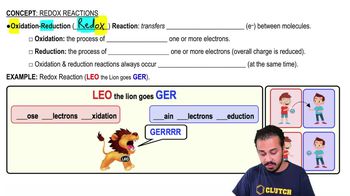Here are the essential concepts you must grasp in order to answer the question correctly.
Reduction
Reduction is a chemical process where a molecule gains electrons or hydrogen atoms, resulting in a decrease in oxidation state. In biological systems, reduction often involves the conversion of oxidized forms of molecules into their reduced counterparts, which is crucial for energy production and metabolic pathways.
Recommended video:
Oxidation-Reduction Reactions
Oxidation-reduction (redox) reactions are chemical reactions that involve the transfer of electrons between two species. In these reactions, one molecule is oxidized (loses electrons) while another is reduced (gains electrons). Understanding these reactions is essential for analyzing metabolic processes, such as cellular respiration and fermentation.
Recommended video:
Metabolic Pathways
Metabolic pathways are series of interconnected biochemical reactions that occur within a cell, leading to the conversion of substrates into products. Each step in a pathway is catalyzed by specific enzymes, and understanding these pathways helps in identifying how molecules like pyruvate and NADH are transformed during cellular metabolism.
Recommended video:
Introduction to Metabolism
 Verified step by step guidance
Verified step by step guidance Verified Solution
Verified Solution



 7:51m
7:51m